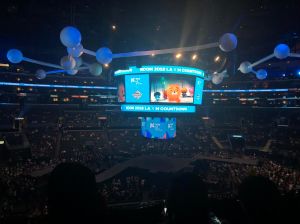K-pop is sweeping the nation launching a new genre of music in America as fans erupt in excitement.
Korean Pop music originated in South Korea and grew in popularity across Asia and now it has made its way to the United States. With boy bands like BTS—which has appeared on The Tonight Show Starring Jimmy Fallon—taking the stage and winning Billboard Music Awards, a new genre has sparked an obsession.
“It might seem to many that PSY single-handedly started the K-pop phenomenon that has swept the globe,” as stated on Billboard’s website. “With ‘Gangnam Style’ his sound and comedic choreography have broken YouTube records, notching over 1.7 billion views since its July 2012 and drawing international attention. However, at the core of K-pop, there are idols. Their combination of western and eastern sounds, perfectly in-sync choreography and fashion choices have all helped K-pop stand out among other genres.”
According to Billboard’s Top 100 for Korean K-pop, Sunmi, Roy Kim, Punch, SHAUN, Im Chang Jung and Ben, along with BTS, are currently sitting at the top of the charts. American devotees to K-pop can be seen in crowds that sing along and repeat dance moves with their hands.
As noted on Bloomberg financial analysis, “Global revenue from K-pop reached a record $4.7 billion in 2016, buoyed by a YouTube audience that spans New York to Shanghai.”
“A lot of Asian people I know listen to it so I think that is the majority,” said Parker Bolliger, CSN student who follows K-pop on occasion. “There is a lot of people who do listen to it that aren’t Asian.”
Bolliger added, “K-pop Twitter basically started ‘stan’ Twitter so I think there’s definitely a big presence online.” Huge fans on Twitter will write ‘we stan’ as a phrase to express their love for the music.
Major K-pop fan Suleme Arriaga, CSN student, said, “I personally think it is great because it is music that can transcend language barriers although not all K-pop fans understand what is being said. The music and videos are enough to convey the mood of the song. It also opens our eyes to a culture that most of us would not have taken interest in before.”
Reciting that sentiment, Tyler McCall, CSN student, said, “K-pop is a music style that passes the language barrier. K-pop is very pleasant sounding even if we don’t easily understand it. K-pop to me is something I strive to learn and memorize. It has helped bring me closer to people, helped me find new friends and even new K-pop groups to listen to.”
The infectious melodies sung mostly in Korean with a few English words in sing-along refrains performed by groups of seven-to-15 members are catching the music industry by storm, according to the blog written by Susanna Lim, associate professor of Korean and Russian studies at University of Oregon.
“Through a relentless pursuit of perfection and perfectly-synced dance moves along with savvy social media presence… groups like BTS are overcoming American stereotypes of Asians and finding a bigger stage on which to perform.”





